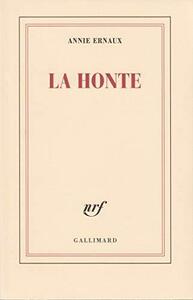You need to sign in or sign up before continuing.
Take a photo of a barcode or cover
emotional
reflective
medium-paced
informative
slow-paced
challenging
dark
sad
fast-paced
reflective
medium-paced
dark
emotional
reflective
sad
slow-paced
Made me think and was relatable sometimes, but also had some parts I didn’t find interesting.
emotional
inspiring
reflective
medium-paced
challenging
dark
emotional
reflective
tense
fast-paced
Moderate: Domestic abuse, Violence
Annie Ernaux is one of those rare authors who manage to incorporate the same themes in all her books, and yet, come out with something interesting and fresh. Shame is one of her earlier books and it tackles the usual subject matter of memory. This time the book is more anthropological in scope.
In June 1952, Annie Ernaux’s father tried to kill her mother. This event set Annie reflecting about the environment and circumstances which led to this action. Thus, there description about working class life in Le Havre, where she lived at the time while her parents ran a café. Here she delves into the working life of the townspeople and labourers such as farmers.
Ernaux then jumps to her own life during 1952, mainly her time at a boarding school – the rules she had to obey, the social hierarchy of students and the trials and tribulations of growing up. Also at this stage she was documenting everything she saw and experienced. It was at this point that the germ of becoming an author entered her mind. As we can see Annie Ernaux has definitely acted on that little inkling and eventually it has won her the Nobel Prize for literature.
Shame concludes with a family vacation where the act takes place and over the years she has visited this spot understanding that the passage of time changes everything but she still does not have a real solution to why her father acted in such a way. All she knows that it was her first steps to becoming an author.
I am biased – I enjoyed reading Shame. I liked reading about post war rural French society and Ernaux’s little observations about the quirks and rules that that these people lived their life by. Once again Shame is brief but it says a lot. It’s also another piece of the puzzle that is Ernaux’s life.
In June 1952, Annie Ernaux’s father tried to kill her mother. This event set Annie reflecting about the environment and circumstances which led to this action. Thus, there description about working class life in Le Havre, where she lived at the time while her parents ran a café. Here she delves into the working life of the townspeople and labourers such as farmers.
Ernaux then jumps to her own life during 1952, mainly her time at a boarding school – the rules she had to obey, the social hierarchy of students and the trials and tribulations of growing up. Also at this stage she was documenting everything she saw and experienced. It was at this point that the germ of becoming an author entered her mind. As we can see Annie Ernaux has definitely acted on that little inkling and eventually it has won her the Nobel Prize for literature.
Shame concludes with a family vacation where the act takes place and over the years she has visited this spot understanding that the passage of time changes everything but she still does not have a real solution to why her father acted in such a way. All she knows that it was her first steps to becoming an author.
I am biased – I enjoyed reading Shame. I liked reading about post war rural French society and Ernaux’s little observations about the quirks and rules that that these people lived their life by. Once again Shame is brief but it says a lot. It’s also another piece of the puzzle that is Ernaux’s life.
emotional
reflective
sad
medium-paced






